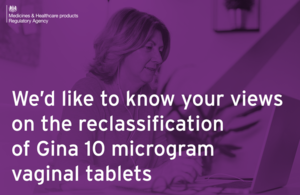Views sought on making first local vaginal HRT product available without need for prescription
The MHRA has launched a public consultation on a set of proposals to make Gina 10 microgram vaginal tablets (Estradiol) available from pharmacies.

New proposals to reclassify the first HRT product for self-care (Gina 10 microgram vaginal tablets, containing estradiol), would mean that women in the UK could access a menopausal treatment at a pharmacy, without requiring a prescription for the first time. Other vaginal tablets that also contain estradiol, including Vagifem will still be available on prescription. This is the MHRA’s first reclassification consultation for a Hormone Replacement Therapy (HRT) product locally applied in the vagina. This product is inserted into the vagina and not taken orally.
Millions of women in the UK go through the menopause every year, with the majority experiencing some symptoms that can be severe and have a negative impact on everyday life. These vaginal tablets are a form of hormone replacement therapy (HRT) that treat vaginal dryness; caused by estrogen deficiency in postmenopausal women.
We are asking GPs, pharmacists and members of the public for their views on whether this product should become a pharmacy medicine and available over the counter, without a prescription.
This consultation seeks views on making this product available over the counter to women aged 50 years and above, who have not had a period for at least 1 year. This is the first time such a change has been considered, making it important that women’s and the public’s views are heard.
Pharmacists are trained healthcare professionals. If the product is reclassified, pharmacists will have access to training materials and a checklist to enable them to identify women who can be supplied with this medicine safely.
Dr Laura Squire, Chief Healthcare Quality and Access Officer at the MHRA, said:
“Every response we receive will be vital in helping us gain a better picture of whether people think this form of vaginal HRT should be available over the counter.
“The menopause can cause unpleasant symptoms and HRT-based medications form an important part of alleviating them. This is why it’s so important for us to hear what women think about this possible reclassification.
“We want to hear from as many people, health care professionals and women’s groups as possible.”
Should this product be reclassified, topical HRT products containing estradiol will still be available on prescription from GPs.
The Commission on Human Medicines has advised that it is safe for this product to be made available as a Pharmacy (P) medicines.
Minister for Women’s Health, Maria Caulfield, said:
“As a woman and a nurse, I know how challenging the symptoms of the menopause can be. In the Women’s Health Strategy call for evidence, women across the country were clear - menopause support is a key issue which we need to do more to address.
“This consultation is another step forward to ensure women’s voices are being heard loud and clear on how they want to access HRT to reduce the impact of the menopause on their lives.
“More widely, we’ve set up a UK-wide Menopause Taskforce and we’ll continue to address the menopause as part of the Women’s Health Strategy, as well as working with campaigners and stakeholders, to make sure we’re supporting women as best we can.”
Details about the consultation, including how to take part can be found here.
Systemic HRT medicines circulate in the blood and are used to treat hot flushes and other menopausal symptoms. They include oral tablets and patches (transdermal patches) and gels which are put on the skin. Local HRT such as Gina works directly where it is applied with very little absorption into the bloodstream.
Notes to Editors
- Consultation on proposal to make Gina 10 microgram vaginal tablets (Estradiol) available from pharmacies
- Medicines and Healthcare products Regulatory Agency (MHRA)is responsible for regulating all medicines and medical devices in the UK by ensuring they work and are acceptably safe. All our work is underpinned by robust and fact-based judgements to ensure that the benefits justify any risks.
- MHRA is an executive agency of the Department of Health and Social Care.
- The Commission on Human Medicines (CHM) advises ministers on the safety, efficacy and quality of medicinal products.